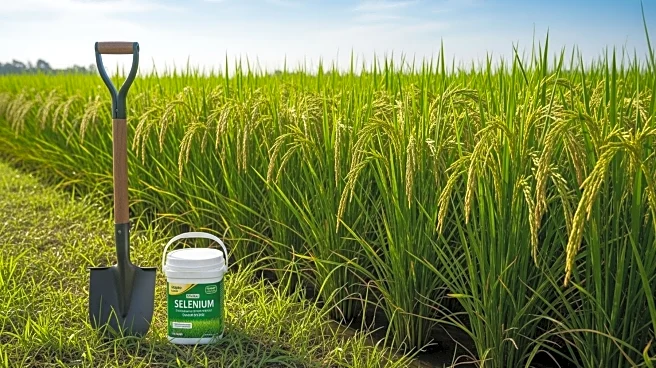What's Happening?
Researchers at the University of Massachusetts Amherst, in collaboration with Jiangnan University in China, have discovered a method to sustainably cultivate rice using nanoscale applications of selenium. This approach reduces the need for fertilizers while maintaining yields, enhancing soil microbial diversity, and cutting greenhouse gas emissions. The study, published in the Proceedings of the National Academy of Sciences, demonstrates the effectiveness of selenium in real-world conditions. Selenium, when applied directly to rice plants, boosts photosynthesis and nutrient absorption, leading to healthier plants and increased yields. This method also reduces the environmental impact of nitrogen fertilization by 41% and increases economic benefits by 38.2% per ton of rice.
Why It's Important?
The development of this sustainable rice cultivation method is significant as rice is a staple food for over 3.5 billion people globally. Traditional rice farming methods are environmentally taxing, contributing to greenhouse gas emissions and water pollution. By improving nitrogen use efficiency and reducing fertilizer application, this new method addresses critical issues such as climate change and the economic costs of agriculture. It offers a promising solution to meet the growing food demands of an increasing global population while minimizing environmental impact. The research could lead to widespread adoption of more sustainable agricultural practices, benefiting both farmers and the environment.
What's Next?
The next steps involve further testing and potential scaling of this method to other crops and regions. Researchers may explore the application of nanoscale selenium in different agricultural contexts to assess its broader applicability. Stakeholders, including agricultural policymakers and environmental groups, may advocate for the integration of this technique into standard farming practices. Additionally, there could be increased interest in developing similar sustainable methods for other staple crops, potentially leading to a shift in global agricultural practices towards more eco-friendly solutions.
Beyond the Headlines
This development highlights the intersection of technology and agriculture, showcasing how scientific advancements can address pressing global challenges. The use of nanoscale elements in farming represents a shift towards precision agriculture, where resources are used more efficiently to maximize output and minimize waste. This approach not only benefits the environment but also supports economic sustainability for farmers, potentially leading to more resilient agricultural systems worldwide.









